09-01
The Israelites [09-01]
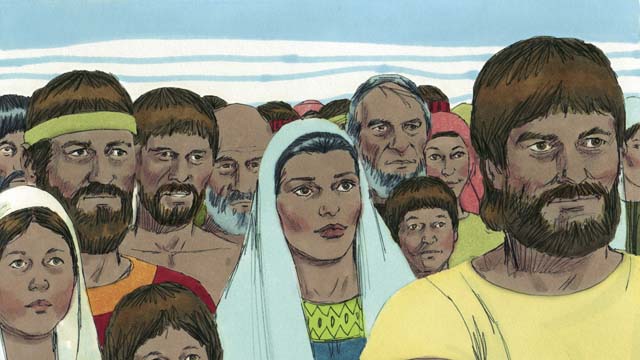
After Joseph died, all of his relatives stayed in Egypt. They and their descendants continued to live there for many years and had many children. They were called the Israelites.
约瑟死了以后,他的家人都留在埃及。他们的后代在埃及地住了很多年,生养众多。他们被称为以色列人。
Important Terms:
Translation Notes:
- called the Israelites - The people group that descended from Jacob was called "Israel," which is the name that God gave to Jacob. The people from that group were called "Israelites."
09-02
A New Pharaoh [09-02]
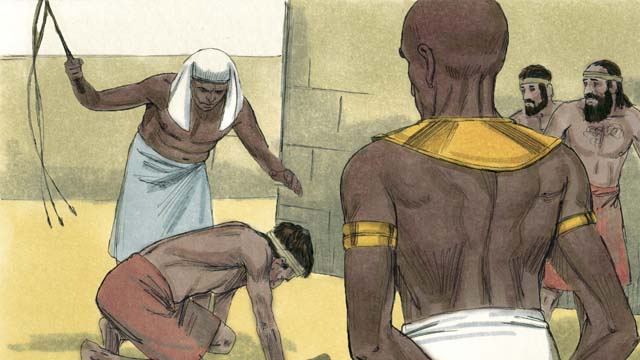
After hundreds of years, the number of Israelites had become very large. The Egyptians no longer remembered Joseph and all he had done to help them. They became afraid of the Israelites because there were so many of them. So the Pharaoh who was ruling Egypt at that time made the Israelites slaves to the Egyptians.
很多年之后,一个新的法老掌权。这时埃及人已经忘了约瑟为他们所做的一切。他们害怕以色列人,因为以色列人人口众多。所以他们把以色列人当成奴隶,强迫他们为自己修建房屋和城池。艰苦的劳动使他们苦不堪言,但是神却祝福他们,让他们的子孙越来越多。
Important Terms:
Translation Notes:
- Pharaoh – "Pharaoh" is an Egyptian word that refers to their king. This Pharaoh was probably the son of a former Pharaoh who had died, who may have been a descendant of the Pharaoh that Joseph knew.
- made the Israelites slaves - That is, "forced the Israelites to do hard labor against their will and treated them very harshly."
09-03
Hard Labor [09-03]
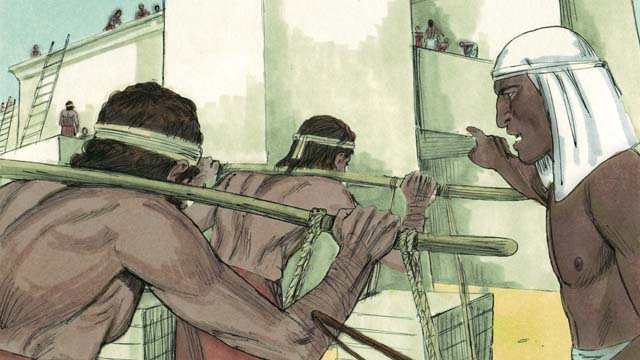
The Egyptians forced the Israelites to build many buildings and even whole cities. The hard work made their lives miserable, but God blessed them, and they had even more children.
法老看到以色列人子孙兴旺,就下令把所有的以色列男孩扔到尼罗河里杀掉。其中一个以色列妇人生了一个男孩,她和丈夫尽量一直藏着他。
Important Terms:
Translation Notes:
- miserable – This means that they suffered terribly because of how harshly they were treated and how hard they were forced to work. They also felt very discouraged.
- God blessed them - God took care of them, helping them endure the severe treatment and even caused them to become more numerous by giving them children.
09-04
Kill the Baby Boys [09-04]
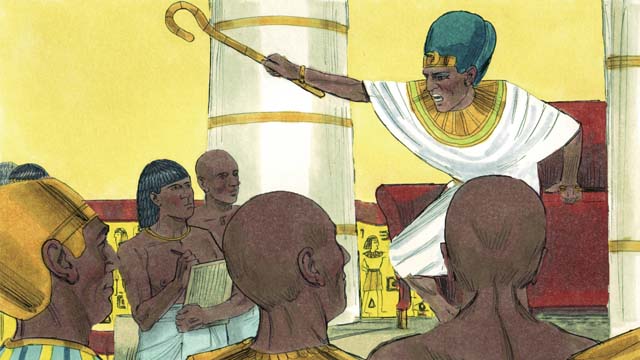
Pharaoh saw that the Israelites were having many babies, so he ordered his people to kill all Israelite baby boys by throwing them into the Nile River.
后来他们把他放到尼罗河上一个漂浮的篮子里。小男孩的姐姐想看看他会怎么样。后来法老的女儿看到了那个篮子,朝里面看了一眼发现里面有个男孩就收做自己的儿子。法老的女儿雇佣了小男孩的母亲喂养他。等他长大以后就给他起名叫摩西。 摩西长大以后,有一天,他发现一个埃及人鞭打一个以色列奴隶。就去救他。摩西杀了并埋了那个埃及人,以为没有人看到。其实有人看到了。
Important Terms:
Translation Notes:
- saw – Another way to say this would be, "realized" or, "knew."
09-05
The Birth of Moses [09-05]
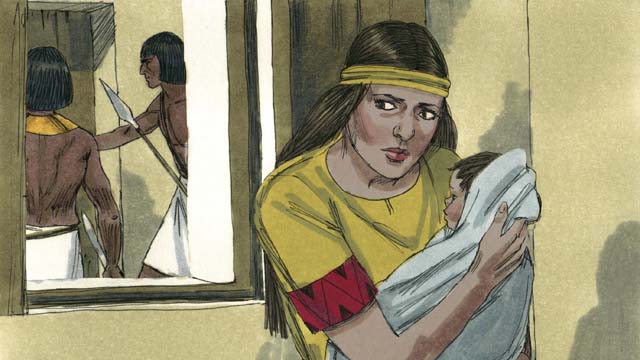
A certain Israelite woman gave birth to a baby boy. She and her husband hid the baby for as long as they could.
法老发现之后就想杀了摩西。摩西就从埃及逃到了旷野之地,在这里比较安全。
Important Terms:
Translation Notes:
- as long as they could - They hid the baby from the Egyptians until it became too difficult to keep him safely hidden in their home.
09-06
Moses in a Basket [09-06]
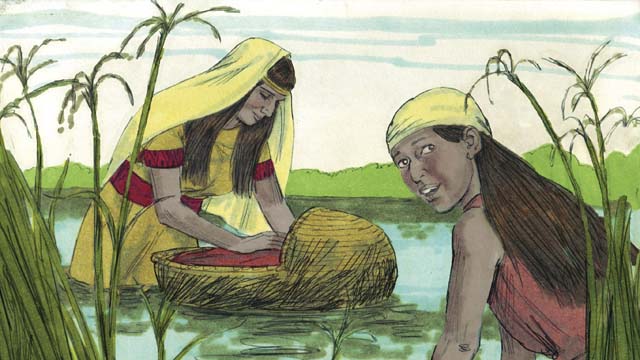
When the boy's parents could no longer hide him, they put him in a floating basket among the reeds along the edge of the Nile River in order to save him from being killed. His older sister watched to see what would happen to him.
在远离埃及的狂野之地,摩西成了牧羊人,并结婚生了两个孩子。
Important Terms:
Translation Notes:
- (There are no notes for this frame.)
09-07
Pharaoh's Daughter [09-07]
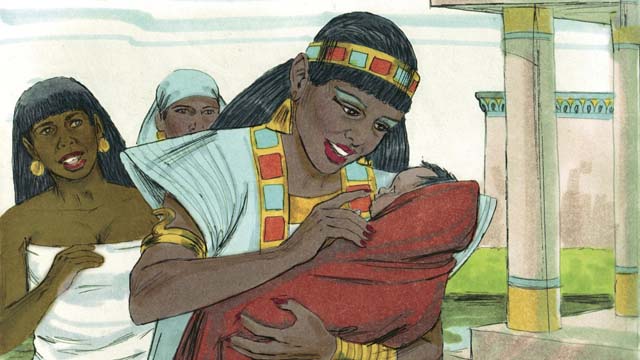
A daughter of Pharaoh saw the basket and looked inside. When she saw the baby, she took him as her own son. She hired an Israelite woman to nurse him without realizing the woman was the baby’s own mother. When the child was old enough that he no longer needed his mother's milk, she returned him to Pharaoh’s daughter, who named him Moses.
一天,摩西在放羊的时候发现一处草地起火了,但是草却没有烧掉,就想走近一点去看。这时,有个声音,是从神那里传来的,说:“摩西,脱掉你的鞋子,你所站的地方是神圣的。”
Important Terms:
Translation Notes:
- took him as her own son - She was a princess. When she made him her son, he became a prince of Egypt.
- to nurse him - Another way to say this would be, "to breastfeed him."
09-08
An Egyptian Beat a Slave [09-08]
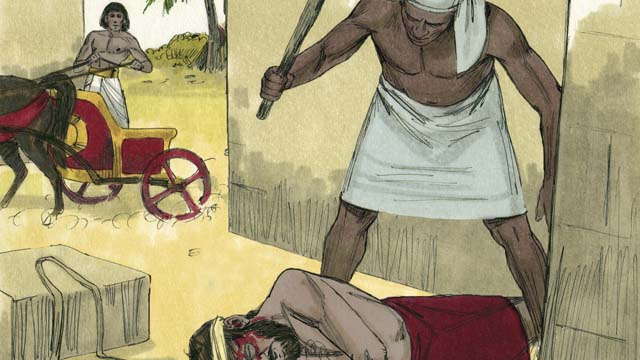
One day, when Moses had grown up, he saw an Egyptian beating an Israelite slave. Moses tried to save his fellow Israelite.
神说:“我看到了我的百姓所受的苦难。我要打发你到法老那去,去把以色列人带出奴役之地埃及。我会把我和许给亚伯拉罕,以撒,雅各的迦南之地赐给他们。”
Important Terms:
Translation Notes:
- grown up - Another way to say this would be, "grown into a man."
- fellow Israelite - This phrase refers to the Israelite slave. The word "fellow" here indicates that Moses was also an Israelite. Although the daughter of the Egyptian Pharaoh raised Moses, Moses remembered that he was really an Israelite.
09-09
Moses Killed an Egyptian [09-09]
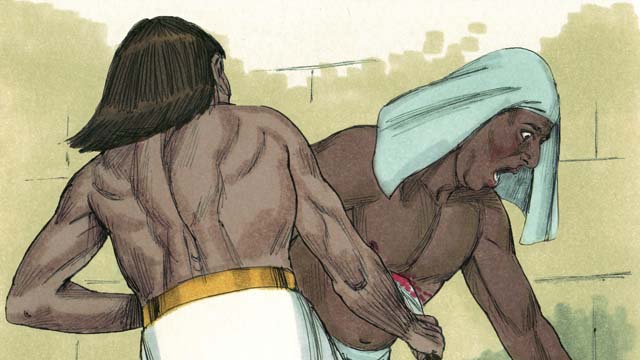
When Moses thought nobody would see, he killed the Egyptian and buried his body. But someone saw what Moses had done.
摩西说:“如果百姓问我是谁派我来的,我该怎么说呢?”神说:“我就是我。告诉他们,‘那自有永有的打发我倒你们这里来’。我的名是永远的。”
Important Terms:
Translation Notes:
- (There are no notes for this frame.)
09-10
Moses Fled from Egypt [09-10]
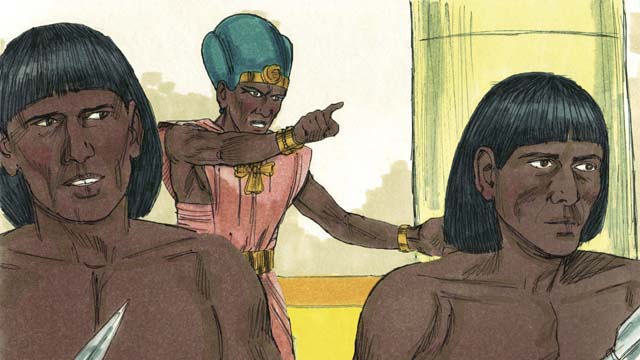
When Pharaoh heard what Moses had done, he tried to kill him. Moses ran away from Egypt to the wilderness where he would be safe from Pharaoh's soldiers.
摩西不想去法老那,神就派他的哥哥亚伦帮他。神警告摩西和亚伦说法老会很顽固的。
Important Terms:
Translation Notes:
- wilderness - The wilderness was a large area that was rocky and dry. The land there was not good for growing food and few people lived there.
09-11
Moses in the Wilderness [09-11]
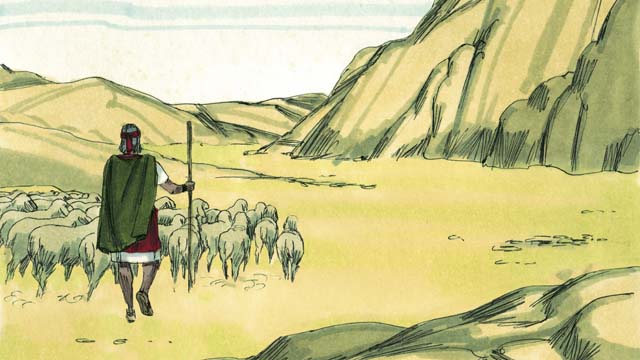
Moses became a shepherd in the wilderness far away from Egypt. He married a woman from that place and had two sons.
NOT TRANSLATED
Important Terms:
Translation Notes:
- wilderness - See how you translated this in [[:zh:obs:notes:frames:09-10|[09-10]]].
09-12
The Burning Bush [09-12]
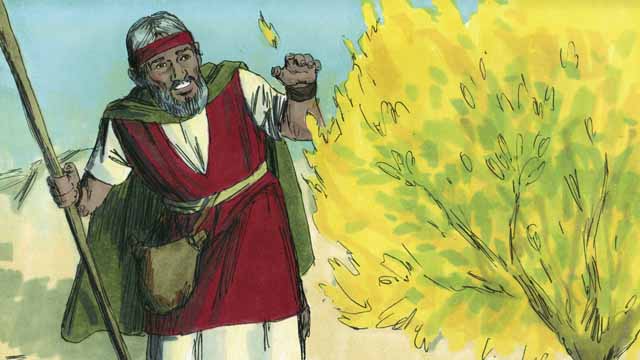
One day while Moses was taking care of his sheep, he saw a bush that was on fire. But the bush did not burn up. Moses went towards the bush to be able to see it better. As he approached the burning bush, the voice of God said, “Moses, take off your shoes. You are standing on holy ground.”
NOT TRANSLATED
Important Terms:
Translation Notes:
- taking care of his sheep - This means he was doing the work of a shepherd to guide the sheep to grass and water, and to protect them. It could be translated as, "tending the sheep."
- bush did not burn up - God made the bush full of fire, but the fire did not damage the bush.
- the voice of God said - This could be translated as, "God said out loud." Moses heard God speak, but he did not see God.
- take off your shoes - God wanted him to take off his shoes to show that he greatly respected God. To make clear the reason for this, you could say, "take off your shoes, because you are on holy ground."
- holy ground - It was holy in the sense that God set it apart from the ordinary land and made it to be a special place where He would reveal Himself.
09-13
God Sent Moses to Egypt [09-13]
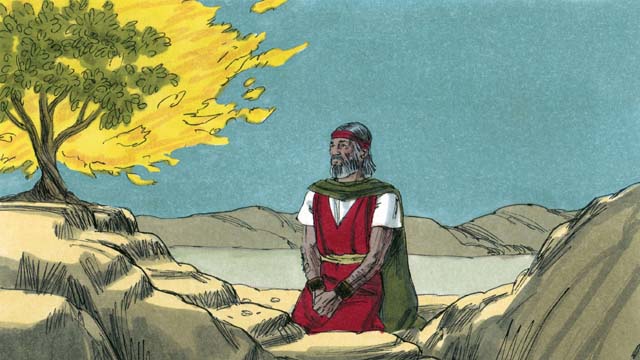
God said, “I have seen the suffering of my people. I will send you to Pharaoh so that you can bring the Israelites out of their slavery in Egypt. I will give them the land of Canaan, the land I promised to Abraham, Isaac, and Jacob.”
NOT TRANSLATED
Important Terms:
Translation Notes:
- suffering of my people - This could be translated as, "the very harsh treatment that my people are experiencing. Some languages might translate this as, "how the Egyptians are giving my people terrible pain."
- my people - This refers to the Israelites. God had made a covenant with Abraham and his descendants that He would bless them and make them into a great nation. Through this covenant, the Israelites became God's own people.
- bring … out of their slavery in Egypt - This can be translated as, "set them free from being slaves in Egypt" or, "bring them out of Egypt where they are now slaves."
09-14
The Name of God [09-14]
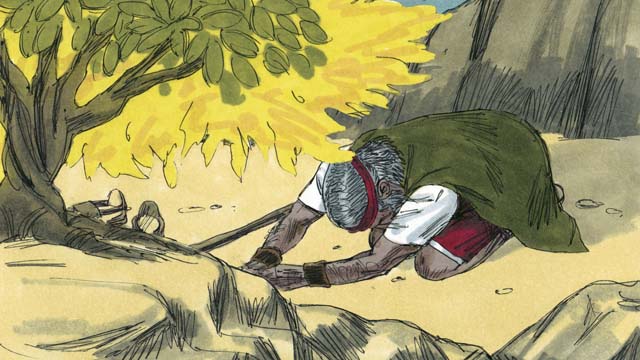
Moses asked, “What if the people want to know who sent me, what should I say?” God said, “I AM WHO I AM. Tell them, ‘I AM has sent me to you.’ Also tell them, 'I am Yahweh, the God of your ancestors Abraham, Isaac, and Jacob.' This is my name forever.”
NOT TRANSLATED
Important Terms:
Translation Notes:
- the people - See "my people" in [[:zh:obs:notes:frames:09-13|[09-13]]].
- I AM WHO I AM - This description shows that God can only be defined by himself, not by anything else that we know of, and he cannot be compared to anyone else.
- I AM - This name emphasizes that God is the only one who has always lived and always will live.
- my name - The name that God told Moses and all of Israel to use for him is "Yahweh," which is related to "I AM" and appears to mean, "HE IS."
09-15
Aaron Helped Moses [09-15]
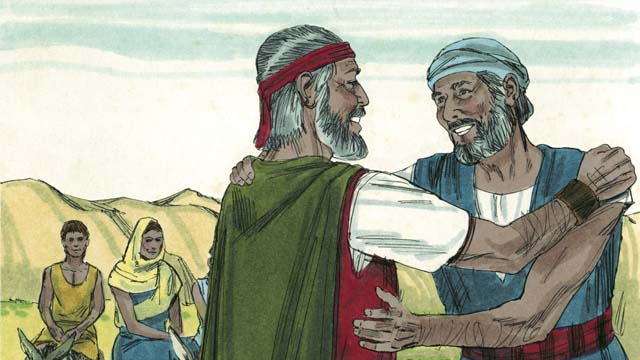
Moses was afraid and did not want to go to Pharaoh because he thought he could not speak well, so God sent Moses’ brother, Aaron, to help him. God warned Moses and Aaron that Pharaoh would be stubborn.
NOT TRANSLATED
Important Terms:
Translation Notes:
- was afraid and did not want to go - Moses knew that Pharaoh wanted to kill him, and he did not believe that he could do what God wanted him to do.
- Moses' brother, Aaron - Aaron was Moses's actual brother from his Israelite mother and father. Aaron would have been at least several years older than Moses.
- stubborn - This means the Pharaoh would refuse to obey God. You may also want to add, "stubborn and refuse to listen (or obey)."
- A Bible story from - These references may be slightly different in some Bible translations.
